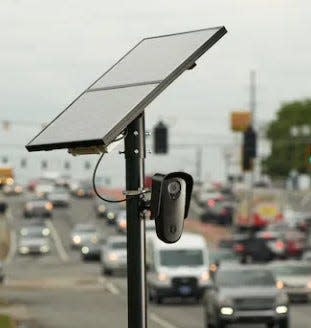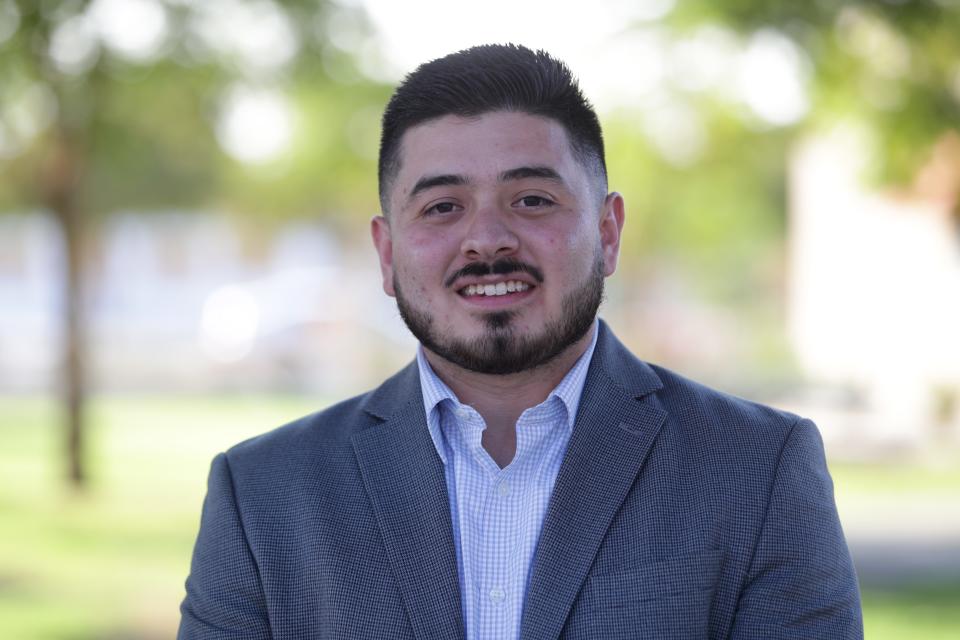Coachella rejects license plate readers over privacy issues, concerns with Chad Bianco
- Oops!Something went wrong.Please try again later.

The Coachella City Council has rejected a years-long effort by the Riverside County Sheriff's Department to install about 70 automatic license plate reader cameras in the city.
Some in the council majority that voted against the proposal during a late July meeting cited privacy concerns and the need for funding other community efforts. Members also cited Sheriff Chad Bianco's recent alignment with a group headed by presidential candidate and Florida Gov. Ron DeSantis that supports new immigration enforcement to address what it calls the "border crisis."
The council's debate and questions from The Desert Sun prompted the sheriff's department to reveal this week that it has stopped sharing with police in other states data on where specific cars are spotted. That's a practice that a digital-privacy group has said violated California law.
Sheriff's Lt. Randy Vasquez presented the proposal for installing dozens of cameras, provided by a company called Flock Safety, to the council on July 26. The proposal would have cost the city about $240,000 initially, and about $210,000 annually.
When some councilmembers raised privacy concerns in their ensuing debate, Vasquez assured them the sheriff's department does not share data from the cameras with departments across state lines.
But a previous public records request by the Electronic Frontier Foundation, a privacy advocacy group, showed the sheriff's department has shared data from the license plate readers, known as ALPRs, with hundreds of agencies, including many in other states.
When told of those findings by The Desert Sun, no councilmember said they were aware the sheriff's department has in fact shared the data — including with police in Ohio, Indiana, Oregon, Arizona, Georgia, Alabama and Florida — and were doing so in the years since the proposal was first considered in 2021.
When asked for this story if he was aware of the scope of the department's sharing practices before the meeting, Vasquez said he asked the department's ALPR program administrator and was told that the department stopped sharing across state lines "several months ago." But he maintained the practice was legal and still an option.
"Although there is existing law that prohibits California law enforcement agencies from sharing information for the purposes of abortion investigations or prosecutions, there currently is no law that prohibits general sharing of ALPR data with out-of-state agencies," Vasquez wrote Wednesday.
It's a claim the Electronic Frontier Foundation and ACLU disagree with, and the focus of a lawsuit against the Marin County Sheriff's Department last year — a case that department resolved out of court by agreeing to stop out-of-state sharing with other police, including federal immigration agencies.
"We're asking departments to stop sending plate data collected in California to other states, because it's the law and those other states don't have the privacy safeguards we have here," said EFF Senior Staff Attorney Adam Schwartz about Riverside County agencies in June.
‘Big Brother’ and immigration policy
Coachella councilmembers were not, in any case, unanimously persuaded by Vasquez's proposal, voting 3-2 against it. The city first considered the cameras in 2021, and councilmembers have repeatedly voiced mixed views about them since. During the July meeting, councilmembers Denise Delgado and Frank Figueroa voted in favor of installing the cameras, saying public safety benefits outweigh privacy concerns.
Karina Quintanilla, mayor pro tem of Palm Desert, attended as a guest and spoke during public comment in support of the proposal saying the system has worked well for assisting investigations in that city. She said Wednesday that she had not been aware of the sheriff's department's broad sharing practices.
Councilmember Stephanie Virgen was one of the three who voted against the cameras, saying she preferred to spend funds on community projects. Mayor Steven Hernandez and Mayor Pro Tem Neftali Galarza said the cameras' ability to capture images of vehicles, in addition to license plates, could enable police and others who are provided with data the ability to track the movements of specific residents.
"This idea of having a comprehensive record of everyone's comings and goings, it's — it feels weird to me, it feels Big Brother," Hernandez said during the meeting. "What's next? A facial reader?"
Galarza said his concern increased after Bianco's alignment, announced in June, with DeSantis' immigration platform.
"The fact that our county sheriff has joined DeSantis' anti-immigration coalition is also very worrisome to me because the idea that now the head of this agency (who) aligns himself with the ideology of a DeSantis has access to undocumented immigrants' daily commute," Galarza said.

He later added that the department's leader's political moves appear to be at odds with Coachella's resolution to be a sanctuary city in 2017. The vote against the cameras and council concerns over Bianco's ties to DeSantis were previously reported by KESQ.
DeSantis, a Republican, announced his platform on immigration after touring the international border in Texas in June, stating that lethal violence might be necessary in response to his concerns about drug trafficking. Bianco was one of about 90 law enforcement leaders across the nation to join a coalition in support of DeSantis' border platform.
Immigration advocates, like the Inland Coalition for Immigrant Justice, blasted Bianco for his allegiance with what it called in a June news release "an anti-immigration task force."
Why sheriff stopped sharing data
When Galarza brought up his concern about data sharing during the July meeting, Vasquez said Galarza shouldn't worry.
"For the camera system itself, we don't share out of state, " Vasquez said.
But Galarza's concerns proved to not be unfounded. Earlier this year, the Electronic Frontier Foundation identified 70 California law enforcement agencies that do share ALPR data with out-of-state agencies. The Riverside County Sheriff's Department is among them. EFF started the investigation over concerns that people could be prosecuted in other states for traveling to California to seek abortions. Many police departments, like in Palm Springs, stopped sharing in response to EFF's work.
EFF and several chapters of the ACLU in California sued then-Marin County Sheriff Bob Doyle claiming a 2015 state law, SB 34, and the California Values Act, made such out-of-state sharing illegal.
The Riverside County Sheriff's Department had, until Vasquez's comments this week, been silent on the claim of illegal data sharing, with department spokespeople not responding to previous requests for comment from The Desert Sun. They stopped sharing, Vasquez said Wednesday, because it wasn't useful, not because of claims it wasn't legal.
"As these questions relate to our deployment and use of Flock Safety ALPR technology, we stopped sharing direct access to our data, by default, with non-California agencies several months ago, primarily because there was no significant investigative benefit to the Riverside County Sheriff’s Office for sharing access with agencies with limited nexus, and after careful consideration of community concerns," Vasquez said in an email.
Asked about what Vasquez told the Coachella council, EFF told The Desert Sun the sheriff's department has not reported that it stopped sharing ALPR data with out-of-state agencies. And the department did not respond to The Desert Sun's request for its most recent data sharing report.
Cameras spread across valley, county
Bianco has been steadily growing the department's inventory of ALPR cameras in recent years. In addition to cameras being operated in all of its Coachella Valley contract cities, the department purchased in 2021 about 260 cameras for use in the county's unincorporated areas. They refused to release to The Desert Sun any further details about where the cameras were installed and why those locations were selected.
The department's data released last year shows its cameras captured some 76 million images from January through October 2022. Police departments in the cities of Desert Hot Springs, Cathedral City, Indio and Palm Springs all operate their own ALPR cameras.
Asked Tuesday about Vasquez's statement that the department does not share its data out of state, Galarza again emphasized his concerns about Bianco's alignment with DeSantis and how the allegiance influences how he utilizes the department's taxpayer funded tools.
"The sheriff has agreed to use his resources to assist Governor DeSantis," Galarza said by phone. "Will he use these too?"
Hernandez urged the department to release its most recent data sharing report to clear the record for the public. All of the other Coachella Valley cities that contract with the sheriff for police services have ALPR cameras, he said, and need to know if that data is being shared. He added that the council needs accurate information when it's considering such expenditures.
"We're contracting with them," said Hernandez by phone Tuesday. "You told us you don't share, but other information is showing you do. What's the truth?"
Both Galarza and Hernandez said they are confident they made the right decision to vote against the cameras regardless of what past and future records show the sheriff's department does with license plate reader data.
"We trust our police officers to do the right thing, but we know data gets used in ways it isn't intended to be," Hernandez said. "This is about privacy and trust. I voted accordingly. We did the right thing."
Christopher Damien covers public safety and the criminal justice system. He can be reached at christopher.damien@desertsun.com or follow him at @chris_a_damien.
This article originally appeared on Palm Springs Desert Sun: Coachella rejects license plate readers, cites privacy and Chad Bianco

